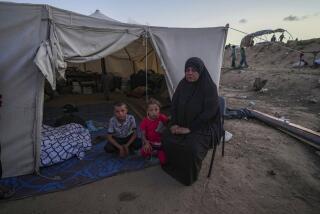Bosnia Still Mired in Bloodshed and Horror a Year After Independence : War: More than 100,000 people have turned up dead or missing in the year since the fighting began. Bosnian authorities and officials in Croatia and Serbia estimate that 2 million or more have fled their homes.
- Share via
BELGRADE, Yugoslavia — More than 100,000 people dead or missing, 2 million displaced, tens of thousands hungry. Countless homes, churches, mosques destroyed. Women raped, children mutilated, a generation of men lost in battle.
Thus reads the list of horrors that began with a weekend independence referendum Feb. 29 and March 1, 1992, requested by the European Community as a precursor to recognizing the new nation of Bosnia-Herzegovina.
The Muslim-Croatian majority, haunted by months of Serb-Croatian warfare after Croatia split from Yugoslavia in 1991, said yes and hoped for international protection.
Bosnia’s Serbs, 31% of its 4.3 million people, opposed separation. They boycotted the referendum, serving notice that they would resist Bosnian independence by any and all means.
“For us, the referendum does not exist,” Radovan Karadzic, leader of the Bosnian Serbs, said at the time. “Its results are irrelevant and could only trigger bloodshed.”
During the voting, three people were killed at a roadblock in Travnik, central Bosnia. Armed Serbs and Croatians faced off in Kupres, soon to be a battlefield. Explosions damaged a mosque northwest of Sarajevo.
Two Serbs were shot to death in an attack on a wedding procession moving through the Muslim heart of Sarajevo. The assailants have not been identified.
After Bosnian leaders proclaimed independence that Sunday night, Serb vigilantes built barricades of cars, buses and trucks in the first blockade of Sarajevo.
Most of the masked, armed Serbs were “shock troops” stationed at the Holiday Inn, which also was headquarters for Western journalists covering the referendum.
Sarajevo, whose mixture of mosques and churches exemplified multicultural Yugoslavia, was about to become a symbol of cruelty and suffering.
Heavily armed Serbs opened fire on 1,000 Muslim, Serb and Croatian demonstrators who chanted, “We will live together!” Three were wounded.
Gunfire also came from the nearby federal army barracks, indicating which side the Serb-dominated Yugoslav army would choose.
“The idea behind the shooting was to show that Serbs, Muslims and Croatians will never be able to live together again and that Bosnia must be partitioned by force,” said Zdravko Grebo, a Sarajevo publicist.
When the West recognized Bosnia in early April, the war escalated.
According to the Bosnian government, more than 100,000 people have turned up dead or missing in the year since the fighting began. Refugee agencies, Bosnian authorities and officials in Croatia, Serbia and Western Europe estimate that 2 million or more have fled their homes.
Defense Minister Janez Jansa of Slovenia and some other military men in the former Yugoslav federation claim that its violent breakup was part of a plan by President Slobodan Milosevic of Serbia and army generals to create a “Greater Serbia.”
They say the plan failed in Slovenia, which seceded and was left alone after a 10-day war that cost 67 lives, and partly succeeded in Croatia, where Serbs control one-third of the territory.
Success remains in doubt in Bosnia, they add, because the international community will not endorse Serb gains.
Milosevic’s critics say armed militias from Serbia were crucial to efforts to start trouble in ethnically mixed communities and inflame old rivalries throughout Yugoslavia.
Success was to be ensured, the argument goes, by secretly arming local Serbs enraged by propaganda about a revival of fascism in Croatia, which was a Nazi puppet state in World War II, and a possible Islamic state in Bosnia.
“Serbs spontaneously rose up because they didn’t want to remain in a Muslim-dominated Bosnia,” Karadzic said recently. “It was natural that they wanted to live with their Serb brothers instead.
“The war could have been avoided if the world community respected the right of self-determination for the Serbs,” added Karadzic, whose troops are accused of the worst atrocities in a war noted for brutality on all sides.
“Croats, Muslims, Macedonians and Slovenes were given the right to secede from Yugoslavia,” he said. “Why was this right withheld only for the Serbs?” Neither Karadzic nor Alija Izetbegovic, the Muslim president of Bosnia, is happy with the proposed division of Bosnia into 10 autonomous provinces.
The plan drafted by international mediators denies Serbs their cherished state and direct land links between Serb-controlled Croatian territory and Serbia. Muslims see it as partition, with Serbs in effect rewarded for “ethnic cleansing” and brutality.
Whatever the plan’s fate, “there will be no peace in Bosnia for years to come because the war has accumulated terrible ethnic hatred,” said President Momir Bulatovic of Montenegro, Serbia’s partner in the remnant of Yugoslavia.
More to Read
Sign up for Essential California
The most important California stories and recommendations in your inbox every morning.
You may occasionally receive promotional content from the Los Angeles Times.












